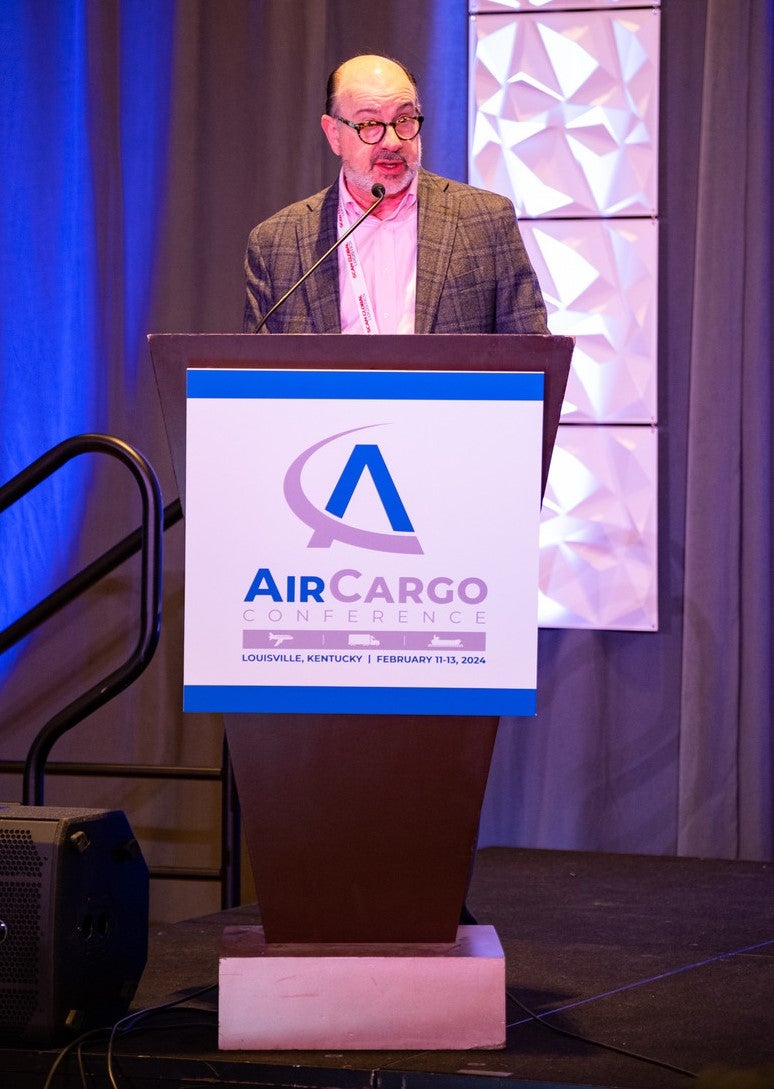LOUISVILLE, Ky. — The Airforwarders Association is interacting with more international organizations to gain wider influence for issues important to U.S. logistics providers. Other priorities this year involve funding to improve airport cargo flows and preventing the White House and Congress from putting the onus on logistics providers for stopping cross-border shipments of fentanyl.
Executive Director Brandon Fried expressed concern during the general membership meeting here last week that the federal government may try to place an unfair level of responsibility on freight forwarding companies to identify and stop illegal shipments of the deadly opioid fentanyl, precursor chemicals and production equipment.
The White House last year promised greater effort to disrupt the trafficking, distribution and sale of fentanyl, including by stopping small packages with fentanyl being shipped in master consolidations into the United States. U.S. Customs and Border Protection is expanding efforts to get members of the trade community to voluntarily provide data that can help law enforcement identify, inspect and intercept suspicious packages.
The agency’s strategy for combating synthetic drugs includes working with express carriers, airlines and logistics companies to share information about suspicious commodities, potential transit routes and other data. It is offering training to customs brokers, carriers, importers and exporter trade associations to teach them how to identify primary ingredients used to make illicit synthetic narcotics.
“We need to be concerned about unfunded government mandates,” said Fried. “That’s not to say we’re not concerned [about the fentanyl crisis]. But when the White House issues proclamations saying transportation intermediaries could be the solution to the problem and members of Congress say the same thing, we agree we want to be helpful, but at the same time we don’t want unfunded mandates saying, ‘Hey, freight forwarders, you know all about those packages. You should be checking them for fentanyl before they come into the United States.’ For us, that’s a nonstarter.”
International advocacy
AfA officials say it’s important to engage globally because many government regulations and actions overseas, including for cargo security and hazardous material handling, have an increasing impact on freight intermediaries based in the U.S. that manage imports and exports. The trade group also hopes to learn how colleagues are adapting to changing conditions and give input on policy and standards being developed by international bodies.

“It means I’m going to be spending a lot of time on airplanes, but it’s for a good cause,” Fried said in an interview during AirCargo 2024, a joint conference with trade associations representing airport executives and express motor carriers.
Last year Fried attended the Transport Logistics conference in Germany, the International Air Transport Association’s World Cargo Symposium in Istanbul, the International Federation of Freight Forwarders Associations’ (FIATA) World Congress in Brussels and The International Air Cargo Association’s executive summit — also in Brussels.
Similar trips are planned this year, starting with IATA’s annual cargo event next month in Hong Kong. Fried is scheduled to speak in April to the Canadian International Freight Forwarders Association in Toronto and plans to bring the entire board to Panama in September for the next FIATA World Congress.
The Airforwarders Association and the National Customs Brokers and Forwarders Associations of America (NCBFAA) joined FIATA in January through a joint membership and now hold one of two U.S. board positions in the organization. AfA is also participating in various FIATA subcommittees.
Another focus for the AfA is addressing the challenge of truck throughput at airports, where outdated infrastructure and lack of digital communications contribute to backlogs of more than two hours to transfer cargo in big cities.
The Airforwarders Association is pushing to get dedicated federal funding for cargo improvements at airports. Together with the NCBFAA, it is pushing legislation within the Federal Aviation Administration’s reauthorization bill that would require the Government Accountability Office to conduct a study that assesses the nation’s needs. With no clear timetable on when the FAA bill will come up for a floor vote, Sens. Maria Cantwell, D-Wash., and Michael Braun, R-Ind., are making direct requests to the GAO to study cargo infrastructure.
“We want funds granted by the federal government to address these cargo areas that haven’t had any substantial investment in infrastructure and technology in years. We are highly optimistic that once that study is completed that more legislation will be driven from it because people will understand the need and the adverse impact it’s having on commerce,” said Fried.
Super Bowl conflict
The tripartite conference overlapped with the Super Bowl for the third consecutive year, a circumstance that potentially dampened attendance because many people want to enjoy parties with friends and neighbors instead of being on a road trip.
Fried said conference organizers have made the best of a difficult hand by hosting watch parties for several hundred attendees.
“When we signed the agreement with Omni Hotels four years ago, the NFL didn’t have a 17-week season. And then they expanded it and put the Super Bowl right on the dates we were going to have the AirCargo conferences in 2022, 2023 and 2024,” he said in the interview.
AirCargo 2025 will be held next March at a new Loews Hotels in Arlington, Texas, situated between the Dallas Cowboys and Texas Rangers’ stadiums, that is still being finished.
And there will be no conflict with the Super Bowl.
RECOMMENDED READING:
Sea-air routes gain as bypass option for Red Sea shipping delays







